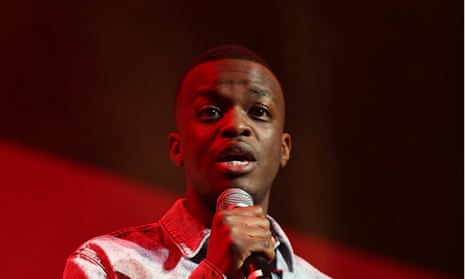The acclaimed spoken-word artist George the Poet has said police strip-searched him because officers stereotype young black men, lacking any positive interactions with them.
The 27-year-old poet, real name George Mpanga, who counts Prince Harry among his friends and appeared on BBC Question Time this year, was searched by police in a van outside his parents’ house in Neasden, north London.
He said it was unjustified and accused police of being rude to his parents and friends. The Metropolitan police said the car he was sitting on had incorrectly shown up on the police national computer as being uninsured, and a review found that the search was carried out in a satisfactory manner.
In an interview with the Guardian, reflecting on the June incident, Mpanga, 27, said: “It’s a challenge for the police. They’re sitting in briefings and they’re going through the information about what they’re about to go out there into and they’re going to say look out for this person, you know, he’s got a warrant out, look out for that person, they’re dangerous, and you’re seeing black face after black face after black face but you don’t have any black people in your life.
“It’s a vicious cycle and because you don’t listen to my music or listen to people like me you don’t have an awareness that, you know, I’m actually making a social contribution. There’s nothing in your imagination that sees anything positive in me, otherwise you’d be a bit more respectful to my parents at least.”
While acknowledging that the police “have a difficult job to do”, he also believes the Met have got it wrong with respect to action they have taken against drill music, a genre of rap with often aggressive lyrics that has been accused of fuelling gang violence in London.
In May, YouTube took down around 30 music videos after a request from the Met, and the following month a London drill rap group was issued with a court order that banned them from making music without police permission.
Mpanga said the action was misguided. He said of drill: “It gives them a release, it occupies them and it’s actually a creative endeavour. It’s an action, it’s a commitment, it’s something that you’re doing, so if you’re doing drill, imagine all the things that person is not doing.”
Mpanga was born and raised on the Stonebridge Park estate in Harlesden and he talks of friends who have been caught up in violence and served jail time.
However, having been to Cambridge University – where he initially harboured ideas of becoming an MP – appeared on Question Time and mixed with royalty, he says he has “been able to walk on both sides of the fence” and wants to use that position to effect change. He said the problem of youth violence was also on the prince’s mind.
“When I saw him [Harry], we were watching Hamilton and he was like: ‘Youth violence has been on my mind and it’s a tragic situation. No one seems to know what to do … We should have further conversations about it.’ … I told him I’ve got some ideas.”
Those ideas include harnessing the creative energy of drill music instead of vilifying it. “Make them feel they have a future, a commercial avenue to pursue, make them feel qualified in making a social contribution,” he said. “We can enrich our young people, lower the crime rate. We can resolve – or begin to resolve – some of the conflicts driving them in this music.”
He welcomed plans announced by the mayor of London, Sadiq Khan, on Wednesday to treat violence as a public health issue, based on a model that has proved successful in Glasgow.
“If you listen to their [drill artists’] music, a lot of it is about creating a mental framework of resilience. That’s what it’s all about: resilience. That’s why it comes across as so cocky sometimes, because it’s just a horrible place,” he said.
“Imagine the paranoia of being a gang member. Now we’re becoming more articulate in our conversations around post-traumatic stress disorder, awareness of mental health issues is increasing, but there’s still a lot of work to do to bring that to the forefront of our conversation.”
